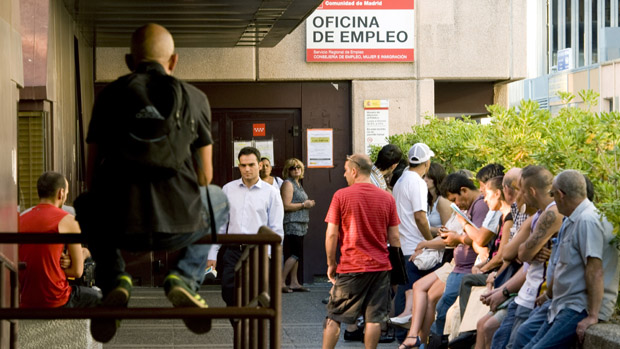'Bleak milestone' as eurozone unemployment hits 12%
Euro falls as predictions of recovery confounded by record joblessness in first two months of year

A free daily email with the biggest news stories of the day – and the best features from TheWeek.com
You are now subscribed
Your newsletter sign-up was successful
UNEMPLOYMENT in the eurozone hit 12 per cent in the first two months of the year, a record level described by analysts as "another bleak milestone".
The jobless rate in the 17 member countries that have adopted the euro as their currency rose to 12 per cent in February, and the January figure was revised up to the same level, from the 11.9 per cent estimated earlier. A total of 19.07 million people were out of work in the eurozone in February, a rise of 33,000, the Eurostat agency said.
The 22nd increase in unemployment in a row means the current labour market downturn in the eurozone is the most prolonged since the early 1990s. Across the wider, 27-country EU the total number of jobless stands at 26.3m, which is also a record.
The Week
Escape your echo chamber. Get the facts behind the news, plus analysis from multiple perspectives.

Sign up for The Week's Free Newsletters
From our morning news briefing to a weekly Good News Newsletter, get the best of The Week delivered directly to your inbox.
From our morning news briefing to a weekly Good News Newsletter, get the best of The Week delivered directly to your inbox.
The bad unemployment numbers, and the suggestion the eurozone is struggling to emerge from recession, caused the euro to fall against the majority of its 16 most-traded peers today.
The Guardian said the latest unemployment figures show predictions that the eurozone economies would stage a recovery this year appear to be "woefully wide of the mark". Instead, the continent seems to be "locked into a spiral of declining manufacturing output and rising unemployment".
Greece was the worst hit with a jobless rate of 26.4 per cent, closely followed by Spain, where 26.3 per cent of the work force was unemployed in January and February. Austria and Germany continue to lead the eurozone in terms of employment, with just 4.8 per cent and 5.4 per cent out of work respectively.
Europeans have been "transfixed" by the financial meltdown in Cyprus, but burgeoning unemployment in the eurozone is a "potentially bigger crisis", says the New York Times. It also stands in "stark contrast" to the US, where unemployment in February declined to 7.7 per cent, the lowest level since late 2008.
A free daily email with the biggest news stories of the day – and the best features from TheWeek.com
Mark Cliffe, chief economist at ING Group, told the paper that spending cuts and tax increases designed to cut debt in "bailed-out eurozone countries" were "feeding off" rising jobless rates. "It's a bit of a vicious circle," he said. "Europe is pursuing a policy that is self-evidently failing."
Analysts say the short-term economic outlook remains bleak, reports the BBC, because many governments are continuing to "cut spending and raise taxes as they struggle to control high deficits and rising debt levels".
-
 5 cinematic cartoons about Bezos betting big on 'Melania'
5 cinematic cartoons about Bezos betting big on 'Melania'Cartoons Artists take on a girlboss, a fetching newspaper, and more
-
 The fall of the generals: China’s military purge
The fall of the generals: China’s military purgeIn the Spotlight Xi Jinping’s extraordinary removal of senior general proves that no-one is safe from anti-corruption drive that has investigated millions
-
 Why the Gorton and Denton by-election is a ‘Frankenstein’s monster’
Why the Gorton and Denton by-election is a ‘Frankenstein’s monster’Talking Point Reform and the Greens have the Labour seat in their sights, but the constituency’s complex demographics make messaging tricky
-
 Unemployment rate ticks up amid fall job losses
Unemployment rate ticks up amid fall job lossesSpeed Read Data released by the Commerce Department indicates ‘one of the weakest American labor markets in years’
-
 Is the UK headed for recession?
Is the UK headed for recession?Today’s Big Question Sluggish growth and rising unemployment are ringing alarm bells for economists
-
 Why has America’s economy gone K-shaped?
Why has America’s economy gone K-shaped?Today's Big Question The rich are doing well. Everybody else is scrimping.
-
 Is the US in recession?
Is the US in recession?Today's Big Question ‘Unofficial signals’ are flashing red
-
 Is Trump's tariffs plan working?
Is Trump's tariffs plan working?Today's Big Question Trump has touted 'victories', but inflation is the 'elephant in the room'
-
 Doing the hustle: Are side gigs a sign of impending recession?
Doing the hustle: Are side gigs a sign of impending recession?In the Spotlight More workers are 'padding their finances while they can'
-
 Frozen pizza sales could be a key indicator of a recession
Frozen pizza sales could be a key indicator of a recessionThe Explainer Sales of the item have been increasing since the pandemic
-
 Trump tariffs: five scenarios for the world's economy
Trump tariffs: five scenarios for the world's economyThe Explainer A US recession? A trade war with China? How 'Liberation Day' could realign the globe